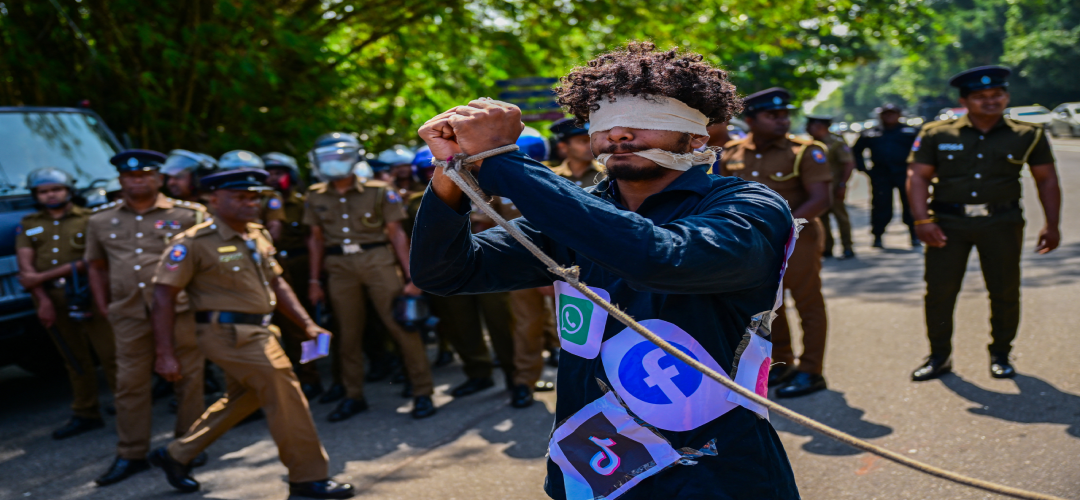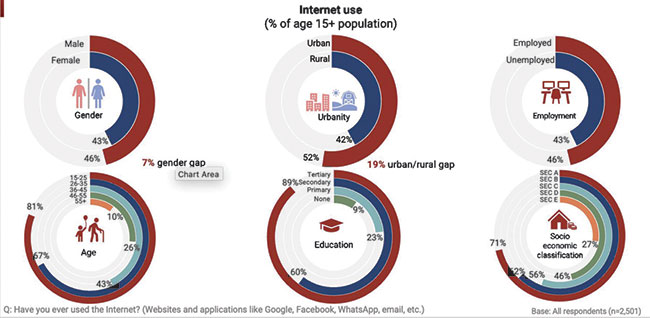Internet Regulation: Sri Lanka Shows the Way
February 17, 2024 | Expert Insights

On 1st, February 2024, Sri Lanka passed the Online Safety Bill, a new law designed to regulate online content. The law aims to address issues like online harassment, hate speech, and misinformation.
However, it has been met with strong criticism from human rights groups and tech companies who argue that it is overly broad and could be used to stifle dissent.
Background
A complex web of regulations with far-reaching implications lies at the crux of this debate. The Bill establishes a five-member Online Safety Commission tasked with assessing and removing content deemed illegal. However, the power dynamics surrounding the Commission raise concerns about its potential role as a gatekeeper rather than a neutral arbiter. Commissioners are appointed by the President, raising concerns about potential political bias and the possibility of using the Commission to silence dissent. Furthermore, the lack of clear criteria for appointment and limited transparency in decision-making processes fuel anxieties about arbitrary censorship and misuse of power.
The Bill defines illegal content in broad terms, encompassing subjective ideas like "causing annoyance" and "causing hatred." These ambiguous definitions lack clarity and are open to subjective interpretation, creating a potential breeding ground for misuse and censorship. Further, the Bill defines "prohibited statements" broadly, encompassing a range of categories that lack clarity and precise boundaries. Notably, these include statements causing "annoyance," "inconvenience," or "injury," terms open to subjective interpretation and susceptible to misuse. Further ambiguity arises with clauses prohibiting statements "causing hatred, ridicule, or contempt," leaving the determination of these emotions largely undefined. This raises concerns about the potential for censorship of legitimate criticism and satire, chilling online discourse and hindering the free exchange of ideas.
The Commission possesses broad powers to investigate and act against prohibited statements and illegal content. It can issue takedown requests to online platforms, impose fines, and even order the blocking of access to websites or accounts deemed non-compliant. While these measures aim to address harmful content, the lack of clear guidelines and robust safeguards against abuse opens the door for potential overreach and censorship. Importantly, the Bill grants the Commission the authority to determine what constitutes "imminent harm," a nebulous term that could further exacerbate concerns about arbitrary action and infringement on freedom of expression.
The Bill holds social media platforms accountable for content posted on their platforms. Failing to comply with takedown requests or disclosing user information could result in hefty fines, even prison sentences for executives. While this aims to incentivize platforms to be more proactive in addressing harmful content, it also raises concerns about potential overreach. Can platforms realistically police content across diverse cultures and languages without compromising user privacy and freedom of expression?
The Bill further restricts anonymity and parody of accounts on social media, fuelling concerns about silencing online dissent and criticism, particularly as Sri Lanka approaches elections. Anonymity can be a crucial tool for whistle-blowers and those expressing unpopular opinions, while parody often serves as a powerful form of social commentary.

Analysis
The Bill has thrust the nation into a heated debate, igniting concerns about its potential impact on both online safety and freedom of expression. While proponents advocate for its ability to combat online threats like cybercrime, child abuse, and misinformation, opponents fear its broad definitions and lack of independent oversight could create a chilling effect on free speech and stifle the digital economy. Understanding the intricate arguments on both sides is crucial for navigating this complex labyrinth.
Proponents of the Bill highlight its potential to address pressing online issues plaguing Sri Lanka. Public Security Minister Tiran Alles cites a staggering 8,000 cybercrime complaints in 2023, emphasizing the need for regulation to combat online fraud, data theft, and child abuse. The government further underscores the Bill's ability to tackle false statements that threaten national security and stability, resonating in a context of recent economic turmoil and political instability. The Online Safety Commission established by the Bill empowers authorities to investigate and take action against harmful content, potentially providing much-needed tools to quell online threats.
Sri Lanka's young population presents a significant driver for economic growth, and the digital economy holds immense potential for job creation. However, the Online Safety Bill threatens to hinder this potential. Stringent regulations and the uncertain environment could discourage the development of new digital enterprises and limit employment opportunities in sectors like IT, content creation, and online marketing. This could have a disproportionate impact on young graduates and skilled professionals seeking entry into the digital workforce.
However, opponents raise grave concerns about the potential infringement on freedom of expression. Human rights groups like Amnesty International and Human Rights Watch warn that the Bill's broad and vague definitions of "prohibited statements" could criminalize legitimate expression, stifling dissent and criticism. They fear the Commission's lack of independent oversight, coupled with the President's appointment power, could lead to political bias and misuse of power, further silencing critical voices. This prospect is particularly alarming, given Sri Lanka's history of controlling free speech. International Organizations have urged Sri Lanka to review the legislation and ensure it complies with international best practices. Domestically, civil society groups, journalists, and media organizations have voiced their opposition to the Bill, highlighting its potential negative impact on free speech and democratic processes.
Tech companies and industry experts warn that the Bill's restrictive measures could create an environment hostile to foreign investment. The vague definitions of "prohibited content" and the perceived lack of transparency in enforcement could deter international technology companies from entering or expanding their operations in Sri Lanka. This stifles innovation and restricts access to cutting-edge technologies, hindering the overall growth of the digital ecosystem.
The Bill's impact extends beyond international giants to domestic businesses as well. The fear of censorship and potential fines could lead to self-censorship by online businesses, limiting their ability to engage freely with customers and hindering e-commerce growth. Additionally, the restrictions on anonymity could discourage online transactions and participation in virtual marketplaces, further dampening the digital economy's vibrancy.
Assessment
- Sri Lanka's recent economic crisis and concerns about online threats highlight the need for stability and security, potentially garnering support for the Bill. However, the potential repercussions on free speech and the digital economy cannot be ignored.
- Striking a balance requires careful consideration. Clear definitions of prohibited statements, independent oversight of the Commission, and robust safeguards for freedom of expression are crucial to ensure the law effectively addresses online harms without infringing on fundamental rights.
- Only through open and informed dialogue can Sri Lanka navigate this challenging terrain and find a solution that protects both online safety and fundamental rights.








Comments